修饰副词介词词组或状语从句时-UNLTD
- 格式:ppt
- 大小:555.00 KB
- 文档页数:30
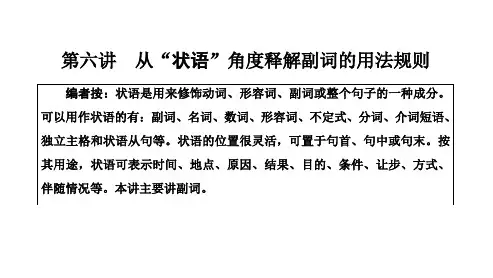
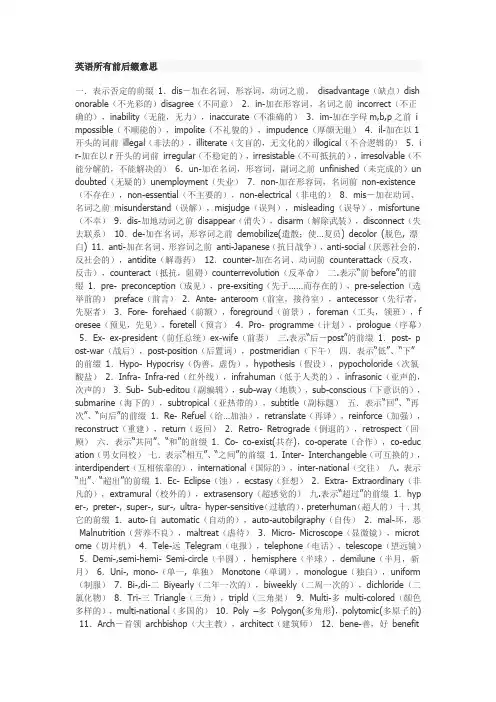
英语所有前后缀意思一.表示否定的前缀1.dis-加在名词、形容词,动词之前。
disadvantage(缺点)dish onorable(不光彩的)disagree(不同意)2.in-加在形容词,名词之前incorrect(不正确的),inability(无能,无力),inaccurate(不准确的)3.im-加在字母m,b,p之前i mpossible(不顺能的),impolite(不礼貌的),impudence(厚颜无耻)4.il-加在以1开头的词前illegal(非法的),illiterate(文盲的,无文化的)illogical(不合逻辑的)5.i r-加在以r开头的词前irregular(不稳定的),irresistable(不可抵抗的),irresolvable(不能分解的,不能解决的)6.un-加在名词,形容词,副词之前unfinished(未完成的)un doubted(无疑的)unemployment(失业)7.non-加在形容词,名词前non-existence (不存在),non-essential(不主要的),non-electrical(非电的)8.mis-加在动词、名词之前misunderstand(误解),misjudge(误判),misleading(误导),misfortune (不幸)9.dis-加地动词之前disappear(消失),disarm(解除武装),disconnect(失去联系)10.de-加在名词,形容词之前demobilize(遣散;使…复员) decolor (脱色, 漂白) 11.anti-加在名词、形容词之前anti-Japanese(抗日战争),anti-social(厌恶社会的,反社会的),antidite(解毒药)12.counter-加在名词、动词前counterattack(反攻,反击),counteract(抵抗,阻碍)counterrevolution(反革命)二.表示“前before”的前缀1.pre- preconception(成见),pre-exsiting(先于……而存在的),pre-selection(选举前的)preface(前言)2.Ante- anteroom(前室,接待室),antecessor(先行者,先驱者)3.Fore- forehaed(前额),foreground(前景),foreman(工头,领班),f oresee(预见,先见),foretell(预言)4.Pro- programme(计划),prologue(序幕)5.Ex- ex-president(前任总统)ex-wife(前妻)三.表示“后-post”的前缀1.post- p ost-war(战后),post-position(后置词),postmeridian(下午)四.表示“低”、“下”的前缀1.Hypo- Hypocrisy(伪善,虚伪),hypothesis(假设),pypocholoride(次氯酸盐)2.Infra- Infra-red(红外线),infrahuman(低于人类的),infrasonic(亚声的,次声的)3.Sub- Sub-editou(副编辑),sub-way(地铁),sub-conscious(下意识的),submarine(海下的),subtropical(亚热带的),subtitle(副标题)五.表示“回”、“再次”、“向后”的前缀1.Re- Refuel(给…加油),retranslate(再译),reinforce(加强),reconstruct(重建),return(返回)2.Retro- Retrograde(倒退的),retrospect(回顾)六.表示“共同”、“和”的前缀1.Co- co-exist(共存),co-operate(合作),co-educ ation(男女同校)七.表示“相互”、“之间”的前缀1.Inter- Interchangeble(可互换的),interdipendert(互相依靠的),international(国际的),inter-national(交往)八. 表示“出”、“超出”的前缀1.Ec- Eclipse(蚀),ecstasy(狂想)2.Extra- Extraordinary(非凡的),extramural(校外的),extrasensory(超感觉的)九.表示“超过”的前缀1.hyp er-, preter-, super-, sur-, ultra- hyper-sensitive(过敏的),preterhuman(超人的)十.其它的前缀1.auto-自automatic(自动的),auto-autobilgraphy(自传)2.mal-坏,恶Malnutrition(营养不良),maltreat(虐待)3.Micro- Microscope(显微镜),microt ome(切片机)4.Tele-远Telegram(电报),telephone(电话),telescope(望远镜)5.Demi-,semi-hemi- Semi-circle(半圆),hemisphere(半球),demilune(半月,新月)6.Uni-, mono-(单一, 单独)Monotone(单调),monologue(独白),uniform (制服)7.Bi-,di-二Biyearly(二年一次的),biweekly(二周一次的),dichloride(二氯化物)8.Tri-三Triangle(三角),tripld(三角架)9.Multi-多multi-colored(颜色多样的),multi-national(多国的)10.Poly –多Polygon(多角形),polytomic(多原子的) 11.Arch-首领archbishop(大主教),architect(建筑师)12.bene-善,好benefit(利益),benevolence(善意)13.homo-同homosexual(同性恋的),homograph(同形异义字)14.neo新neo-colonialism(新殖民主义),neolithic(新石器时代的)15.or tho-正确,直orthogonal(直角的),orthodox(正统)16.philo-挚爱philosopher(哲学家)17.proto-原始protohydrogen(初氢),prototype(原型),protoplasm(原生质)18.pseudo-假的, 伪的, 冒充的pseudonym(匿名),pseudo-communism(假共产主义)19.a-,ab-,abs-(只有在t,c之前)从,自avoid(避免),absent(缺少的),abstain(抑制),abstract(吸引)20.Apo-,aph-来自apology(道歉,谢罪),apostl e(倡言者,先驱)21.se-分离separation(分开),secure(安全的),sedition(煽动叛乱)22.para-防parachute(降落伞),23.omni-所有的,公共的omnibus(公共汽车),omnipotence(万能)24.pan-全,泛Pan-American(全美的),pancean(万灵药),panorama(风景的全貌;万花筒)25.panto-全pantisocracy(乌托邦大同世界),pantoscopic(视野广大)26.dia-通过,借以diagonal(对角的),diagnosis(诊断),dialogue(对话)27.Per-通过,彻底,不利perambrlate(走来走去),perfect极好的28.trans-通过,横过transcript(抄本, 副本; 记录),translation(翻译),trxnsparent (透明的),transport(运输),trans-plant(移植)29.Com-,con-,cor-,col-共同,和,完全comment(评论),compile(编辑),correlation(相互关系),collect(收集),c orruption(贪污腐败),collaborate(合作,合著)30.syn-共同synonym(同义词),synchronization(同步),syntonic(谐振的),synthetic(人工的,合成的)31.meta-和,在……之后metaphor(比喻),metaphysics(形而上学)32.Cis-在这一边cisatla ntic(大西洋这边的)33.pen-几乎,相近peninsular(.住在半岛上的居民,半岛(状)的, 形成半岛的)34.en-,em-往……里,使…… encamp(扎营),enable(使……能),endear (使……受喜爱),embrace(拥抱,抓住(机会))35.intro内在intracardiac(心脏内部的),intramolecular(分子内部的),intracelular(细胞内部的)36.intro-到……中introduce (介绍),introspect(反省,内省)37.dys-坏dyspepsia(消化不良),dysentry(痢疾)38.Eu-优,美好eulogy(颂词),euphony(悦耳的声音)39.ambi-,amphi-两者amphibian(两栖的),ambidextrous(两只手都很灵巧的;心怀二意的;非常灵巧的)40.p enta-五pentagon(五角大楼),pentagram(五角星),pentameter(五步诗句)41.s ex-六sexangle(六角),sexennial(六年一度的)42.sept-七September九月(古罗马的七月),septennial(七年一度)43.hepta-七heptab(七个成套之物),heptagon (七角形)44.octa-,octo,oct八octagon(八角形),octuple(八倍)October (十月) 45.nona-,ennea-九nonagon(九角形),ennead(九个一组)46.deci-,deca-十deci mal(十进位的),decagramme(十克)47.centi-百centimeter(厘米),centipede (蜈蚣)48.milli-千millenias(千年的),millimeter(毫米)49.Kilo-千kilowatt(千瓦),kilometer(千米)后缀1.-ster,-eer,-er(or)意为:从事某种职业或参与某种活动的人(person engaged in an occupation or activity)例词:gamester,gangster,so ngster,engineer,profiteer,mountaineer,auctioneer,driver,teacher,director,acto r,professor 2.-let意为:小或者不重要的东西(small,unimportant things)例词:boo klet,leaflet,starlet 3.-ette意为:1)小的东西(small)例词:cigarette 2)假的东西(imitation)例词:leatherette 3)女性(female)例词:usherette 4.-ess意为:女性(female)例词:actress,poetess,hostess,paintress 5.-hood意为:时期(status;e tc.)例词:boyhood,childhood,manhood 6.-ship意为:才能,状态,资格,品质等(skill,state,condition,status,quality)例词:leadership,friendship,membership,lectureship,sportsmanship 7.-ful意为:量(the amount which noun contains)例词:cupful,handful,mouthful,spoonful 8.-tion,-ion意为:1)状态,行动等(state;action;etc.)例词:action,oppression,possession,education,starva- tion 2)机构等(institution;etc.)例词:organization,foundation 9.-ment意为:状态,行动等(state;action;etc.)例词:movement,enslavement,pavement 10.-al意为:动作(action)例词:arrival,refusal,revival,recital,removal 11.-age意为:程度,数量等(extent;amount;etc.)例词:wastage,coverage,acreage,shrinkage,brea kage,hostage 12.-ness;-ity(ty)意为:状态,品质(state;quality;etc.)例词:h appiness,usefulness,selfishness,kindness,rapidity,activity,sanity,changeability 13.-ism意为:道义,主义,学说等(doctrine of,practice of)例词:idealism,impre ssionism,absenteeism,racism 二、动词后缀常见的此类后缀及其具体含义如下:1.-ify意为:转为,变为(to turn into,to make or become)例词:beautify,diversify,s implify 2.-ize;-en意为:使……,变得……(to make or become ;to make into)例词:modernize,popularize,legalize,hospitalize,symbolize,ripen,widen,heighten,thr eaten 3.-ate意为:增加,使……(give or add,make or become)例词:originate,hydrogenate,validate,differentiate 三、形容词后缀:常见的此类后缀及其具体含义如下:1.-ful意为:充满,有(full of;hav- ing;giving;etc.)例词:useful,pitiful,hopeful,helpful,forgetful,thankful,fearful 2.-less意为:没有,无(without;not giving)例词:speechless,childless,harmless,hopeless,meaningless 3.-ly意为:有……品质的(having the qualities of)例词:beastly,manly,brotherly,friendly 4.-like意为:像……的(like)例词:childlike,statesmanlike,tiger-like 5.-y;-ish意为:像……一般的(somewhat like)例词:meaty,sandy,silky,hairy,leafy,watery,foolish,g irlish,blackish,thinnish 6.-some意为:像……一样的;引起……的;有……品质的(like;causing;having the quality of)例词:troublesome,burdensome,wholesome,tireso me,bothersome 7.-able(ible)意为:能……的;可以……的(able to be ;capable)例词:changeable,readable,drinkable,comfortable,expansible,convincible 8.-ed 意为:有……的(having,etc.)例词:wooded,pointed,moneyed,odd-shaped 9.-al意为:有……属性的,……类型的(nature of,typical of)例词:cultural,personal,re gional,musical 10.-ary(ory)意为:属于……的,与……相连的(belonging to;connec ted with)例词:revolutionary,imaginary,contradictory 11.-ous意为:富含……的;有……品质的;像……的(full of;having the quality of;like)例词:glorious,erroneou s,malicious,gracious 12.-ic(ical)意为:……类的;属于……的(typical of;belongin g to)例词:historic,historical,methodic,methodical,dramatic,heroic 13.-ive意为:有……属性的;有某种倾向的(having the nature or quality of;given or tending t o)例词:attractive,talkative,restrictive,defensive,preventive,constructive,sensi tive 四、副词后缀常见的此类后缀及其具体含义如下:1.-ly意为:以……方式(in a... manner;etc.)例词:happily,boldly,attentive- ly,strangely 2.-ward(s)意为:表示方式或动作的方向(manner and direction of movement)例词:onward(s),bac kward(s),earthward(s),homeward(s),eastward(s)3.-wise意为:1)按照……方式(in the manner of)例词:crabwise,clockwise2)就……而言(as far as ...is con cerned)例词:weatherwise ,educationwise 有一个原因的单音节词,结尾只有一个单音辅音,在加以元音后缀是,要双写这个辅音.例词:run + er = runner hit + ing = hitt ing。
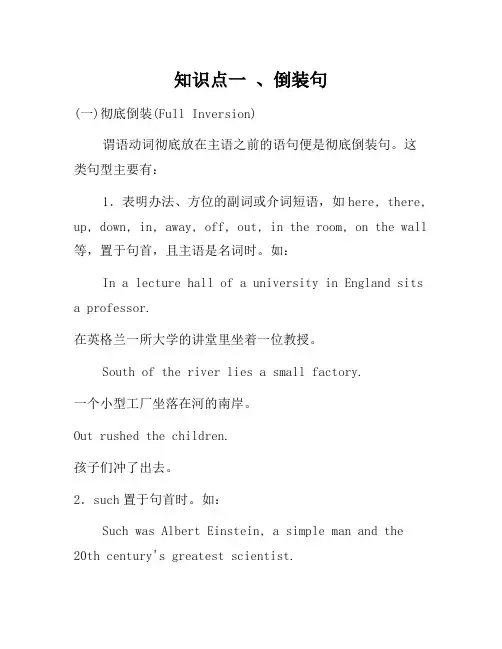
知识点一、倒装句(一)彻底倒装(Full Inversion)谓语动词彻底放在主语之前的语句便是彻底倒装句。
这类句型主要有:1.表明办法、方位的副词或介词短语,如here, there, up, down, in, away, off, out, in the room, on the wall 等,置于句首,且主语是名词时。
如:In a lecture hall of a university in England sits a professor.在英格兰一所大学的讲堂里坐着一位教授。
South of the river lies a small factory.一个小型工厂坐落在河的南岸。
Out rushed the children.孩子们冲了出去。
2.such置于句首时。
如:Such was Albert Einstein, a simple man and the20th century's greatest scientist.这便是艾伯特·爱因斯坦,一个朴素的人,也是20世纪最巨大的科学家。
(二)部分倒装(Partial Inversion)只把谓语的一部分(多为助动词或神态动词)置于主语之前的语句叫部分倒装句。
这类句型主要有三种:1.only润饰副词、介词短语或状语从句,且放在句首时。
如:Only in this way can we learn English well.只要以这种办法,咱们才干学好英语。
Only when he returned did we find out the truth.只要当他回来时,咱们才查明晰本相。
运用特色:1.在部分倒装句中,假如谓语部分无助动词,则须找助动词来“协助”它构成倒装句。
如:(×)Only aft er the war learned he the sad news.(√)Only after the war did he learn the sad news.只是在战后他才知道那个凄惨的音讯。
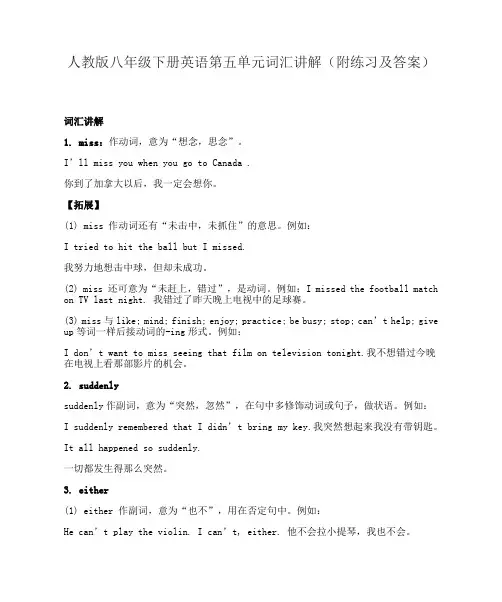
人教版八年级下册英语第五单元词汇讲解(附练习及答案)词汇讲解1. miss:作动词,意为“想念,思念”。
I’ll miss you when you go to Canada .你到了加拿大以后,我一定会想你。
【拓展】(1) miss 作动词还有“未击中,未抓住”的意思。
例如:I tried to hit the ball but I missed.我努力地想击中球,但却未成功。
(2) miss 还可意为“未赶上,错过”,是动词。
例如:I missed the football match on TV last night. 我错过了昨天晚上电视中的足球赛。
(3) miss与like; mind; finish; enjoy; practice; be busy; stop; can’t help; give up等词一样后接动词的-ing形式。
例如:I don’t want to miss seeing that film on television tonight.我不想错过今晚在电视上看那部影片的机会。
2. suddenlysuddenly作副词,意为“突然,忽然”,在句中多修饰动词或句子,做状语。
例如:I suddenly remembered that I didn’t bring my key.我突然想起来我没有带钥匙。
It all happened so suddenly.一切都发生得那么突然。
3. either(1) either 作副词,意为“也不”,用在否定句中。
例如:He can’t play the violin. I can’t, either. 他不会拉小提琴,我也不会。
(2) either pron.(两者中)任意一个。
例如:There are many trees on either side of the street. 在街道的每一边都有很多树。
(3) either…or…为连词短语,连接两个相同的句子成分,意为“要么……要么……;或者……或者……;不是……就是……”。
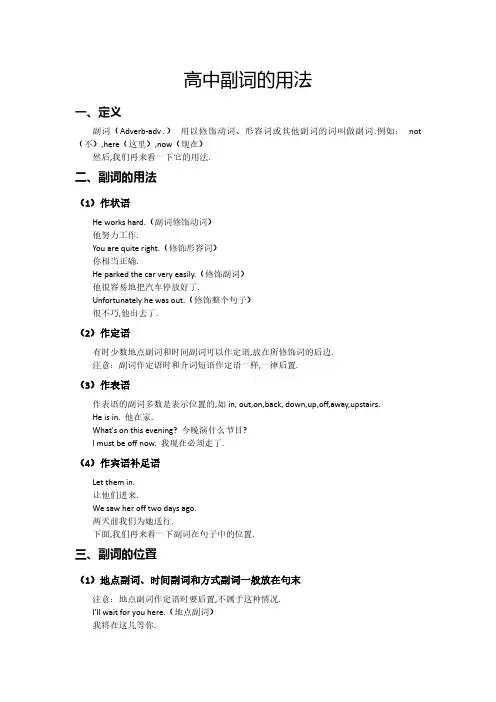
高中副词的用法一、定义副词(Adverb-adv.)用以修饰动词、形容词或其他副词的词叫做副词.例如:not (不),here(这里),now(现在)然后,我们再来看一下它的用法.二、副词的用法(1)作状语He works hard.(副词修饰动词)他努力工作.You are quite right.(修饰形容词)你相当正确.He parked the car very easily.(修饰副词)他很容易地把汽车停放好了.Unfortunately he was out.(修饰整个句子)很不巧,他出去了.(2)作定语有时少数地点副词和时间副词可以作定语,放在所修饰词的后边.注意:副词作定语时和介词短语作定语一样,一律后置.(3)作表语作表语的副词多数是表示位置的,如in, out,on,back, down,up,off,away,upstairs.He is in. 他在家.What's on this evening? 今晚演什么节目?I must be off now. 我现在必须走了.(4)作宾语补足语Let them in.让他们进来.We saw her off two days ago.两天前我们为她送行.下面,我们再来看一下副词在句子中的位置.三、副词的位置(1)地点副词、时间副词和方式副词一般放在句末注意:地点副词作定语时要后置,不属于这种情况.I'll wait for you here.(地点副词)我将在这儿等你.I'll meet him at the station tomorrow.(时间副词)明天我将去车站接他.Tomorrow I'll meet him at the station.注意:有时为了强调时间,也可把时间副词放在句首.The boy wrote the homework quickly.(方式副词)这个男孩子写作业很快.They did their experiments carefully in the lab yesterday.方式地点时间昨天他们在实验室认真地做实验.The students all worked well here last week这些学生上周在这里都做得很好.(2)频度副词在句中位置有以下两种a.在be动词、情态动词及第一个助动词之后.She is always kind to us(be动词)她对我们总是很好.I can never forget the day.(情态动词)我永远也不能忘掉这一天.The work has never been done.助动词助动词(频度副词never放在第一个助动词has的后面)这件工作永远也做不完.b.在实义动词之前He often goes to school early.(实义动词)他常常早到校.(3)程度副词有下列二种情况a.修饰动词时,它在句中的位置与频度副词的情况相似.He is almost forty years old.(在be动词之后)他快四十岁了.注意:如果句末同时有几个副词,它的基本顺序是:方式副词+地点副词+时间副词.He can hardly understand you.(在情态动词之后)他几乎听不懂你的活.I like the boy.(在实义动词之前)我相当喜欢这个男孩子.b.修饰形容词、副词时,放在它所修饰的词的前面.He studies much harder now.现在他学习努力多了.The room is big enough to hold fifty persons.(enough修饰形容词)这个房间够大的可以容纳50人.He runs fast enough.(enough修饰副词)他跑得够快的.例外:只有enough例外,置于所修饰的形容词和副词后边.四、副词的排列顺序1)时间,地点副词,小单位的在前,大单位在后.2)方式副词,短的在前,长的在后,并用and或but等连词连接.Please write slowly and carefully.3)多个不同副词排列:程度+地点+方式+时间副词.注意:副词very 可以修饰形容词,但不能修饰动词.改错:(错) I very like English.(对) I like English very much.注意:副词enough要放在形容词的后面,形容词enough放在名词前后都可.I don't know him well enough.There is enough food for everyone to eat.There is food enough for everyone to eat.五、副词的比较级和最高级副词比较级和最高级的变化形式与形容词基本上一样(1)一般副词hard→harder →hardestfast→faster →fastestlate→later →latestearly→earlier →earliest(2)特殊副词well →better →bestmuch →more →mostbadly →worse →worstlittle →less →least 但是,开放类副词即以后缀?ly结尾的副词不能像形容词那样加?er 或?est,如quickly →more quickly →most quickly quietly →more quietly →most quietly〔注〕:early中的?ly不是后缀,故可以把?y变?i再加?er和?est(3)兼有两种形式的副词1) close与closelyclose意思是"近";closely 意思是"仔细地"He is sitting close to me.Watch him closely.2) late 与latelylate意思是"晚";lately 意思是"最近"You have come too late.What have you been doing lately?3) deep与deeplydeep意思是"深",表示空间深度;deeply时常表示感情上的深度,"深深地" He pushed the stick deep into the mud.Even father was deeply moved by the film.4) high与highlyhigh表示空间高度;highly表示程度,相当于muchThe plane was flying high.I think highly of your opinion.5) wide与widelywide表示空间宽度;widely意思是"广泛地","在许多地方"He opened the door wide.English is widely used in the world.6) free与freelyfree的意思是"免费";freely 的意思是"无限制地"You can eat free in my restaurant whenever you like.You may speak freely; say what you like.。
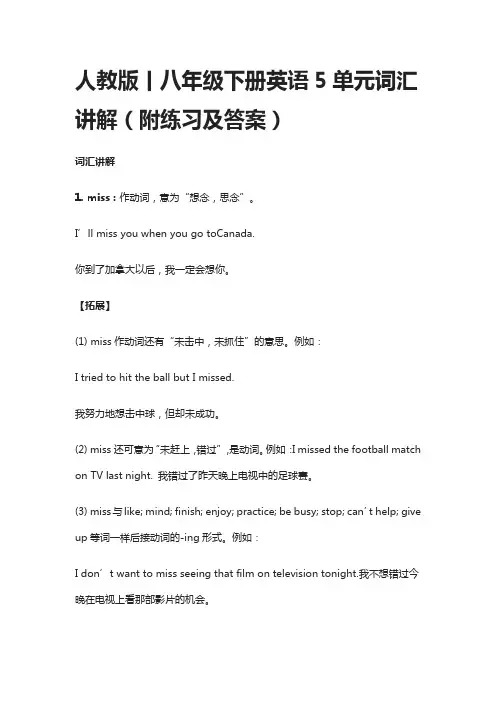
人教版丨八年级下册英语5单元词汇讲解(附练习及答案)词汇讲解1. miss:作动词,意为“想念,思念”。
I’ll miss you when you go toCanada.你到了加拿大以后,我一定会想你。
【拓展】(1) miss作动词还有“未击中,未抓住”的意思。
例如:I tried to hit the ball but I missed.我努力地想击中球,但却未成功。
(2) miss还可意为“未赶上,错过”,是动词。
例如:I missed the football match on TV last night. 我错过了昨天晚上电视中的足球赛。
(3) miss与like; mind; finish; enjoy; practice; be busy; stop; can’t help; give up等词一样后接动词的-ing形式。
例如:I don’t want to miss seeing that film on television tonight.我不想错过今晚在电视上看那部影片的机会。
2. suddenlysuddenly作副词,意为“突然,忽然”,在句中多修饰动词或句子,做状语。
例如:I suddenly remembered that I didn’t bring my key.我突然想起来我没有带钥匙。
It all happened so suddenly.一切都发生得那么突然。
3. either(1) either作副词,意为“也不”,用在否定句中。
例如:He can’t play the violin. I can’t, either. 他不会拉小提琴,我也不会。
(2) either pron.(两者中)任意一个。
例如:There are many trees on either side of the street. 在街道的每一边都有很多树。
(3) either…or…为连词短语,连接两个相同的句子成分,意为“要么……要么……;或者……或者……;不是……就是……”。
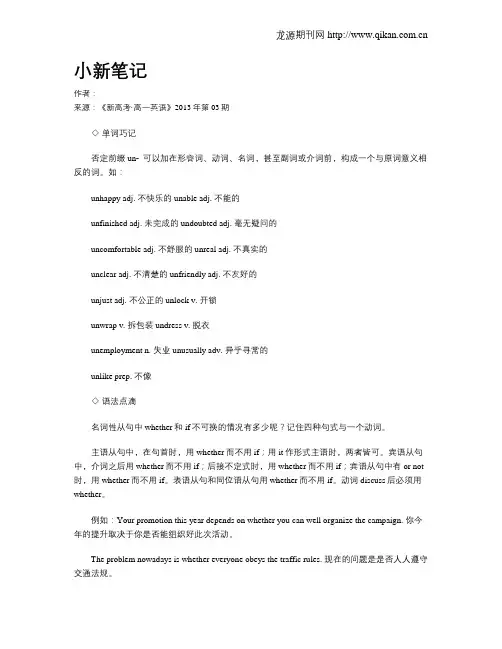
小新笔记作者:来源:《新高考·高一英语》2013年第03期◇单词巧记否定前缀un⁃可以加在形容词、动词、名词,甚至副词或介词前,构成一个与原词意义相反的词。
如:unhappy adj. 不快乐的 unable adj. 不能的unfinished adj. 未完成的 undoubted adj. 毫无疑问的uncomfortable adj. 不舒服的 unreal adj. 不真实的unclear adj. 不清楚的 unfriendly adj. 不友好的unjust adj. 不公正的 unlock v. 开锁unwrap v. 拆包装 undress v. 脱衣unemployment n. 失业 unusually adv. 异乎寻常的unlike prep. 不像◇语法点滴名词性从句中whether和if不可换的情况有多少呢?记住四种句式与一个动词。
主语从句中,在句首时,用whether而不用if;用it作形式主语时,两者皆可。
宾语从句中,介词之后用whether而不用if;后接不定式时,用whether而不用if;宾语从句中有or not 时,用whether而不用if。
表语从句和同位语从句用whether而不用if。
动词discuss后必须用whether。
例如:Your promotion this year depends on whether you can well organize the campaign. 你今年的提升取决于你是否能组织好此次活动。
The problem nowadays is whether everyone obeys the traffic rules. 现在的问题是是否人人遵守交通法规。
We are discussing whether all of us are aware of the problem of air pollution. 我们正在讨论是否我们所有人都意识到空气污染的问题。
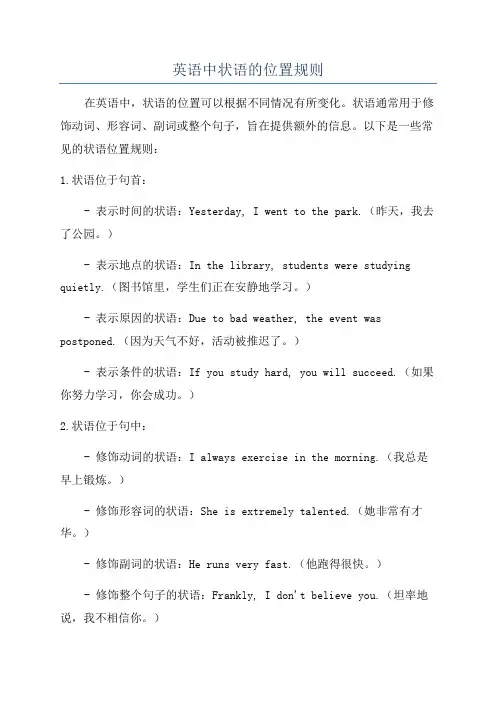
英语中状语的位置规则在英语中,状语的位置可以根据不同情况有所变化。
状语通常用于修饰动词、形容词、副词或整个句子,旨在提供额外的信息。
以下是一些常见的状语位置规则:1.状语位于句首:- 表示时间的状语:Yesterday, I went to the park.(昨天,我去了公园。
)- 表示地点的状语:In the library, students were studying quietly.(图书馆里,学生们正在安静地学习。
)- 表示原因的状语:Due to bad weather, the event was postponed.(因为天气不好,活动被推迟了。
)- 表示条件的状语:If you study hard, you will succeed.(如果你努力学习,你会成功。
)2.状语位于句中:- 修饰动词的状语:I always exercise in the morning.(我总是早上锻炼。
)- 修饰形容词的状语:She is extremely talented.(她非常有才华。
)- 修饰副词的状语:He runs very fast.(他跑得很快。
)- 修饰整个句子的状语:Frankly, I don't believe you.(坦率地说,我不相信你。
)3.状语位于句尾:- 修饰动词的状语:She sang the song beautifully.(她唱得很漂亮。
)- 修饰形容词的状语:He is clever indeed.(他确实很聪明。
)- 修饰副词的状语:He ate the cake quickly.(他迅速地吃了蛋糕。
)- 修饰整个句子的状语:All things considered, it was a good decision.(综上所述,这是一个好的决定。
)需要注意的是,当一个英语句子中有多个状语时,它们的顺序通常遵循以下规则:1.时间状语放在地点状语之前:- I went to the park yesterday in the afternoon.(我昨天下午去公园。
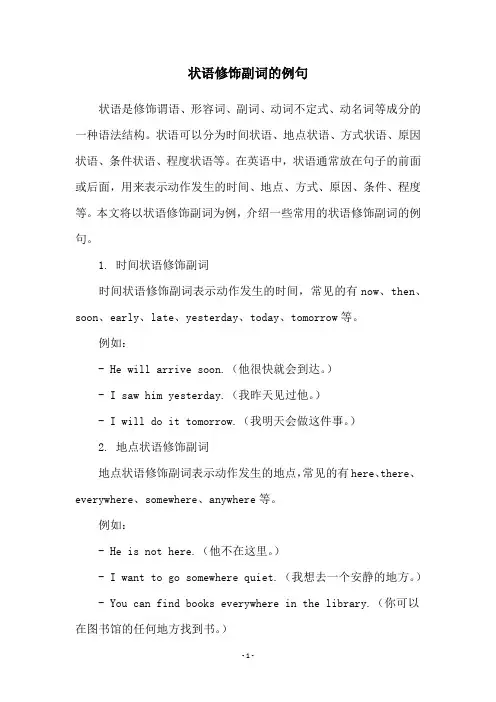
状语修饰副词的例句状语是修饰谓语、形容词、副词、动词不定式、动名词等成分的一种语法结构。
状语可以分为时间状语、地点状语、方式状语、原因状语、条件状语、程度状语等。
在英语中,状语通常放在句子的前面或后面,用来表示动作发生的时间、地点、方式、原因、条件、程度等。
本文将以状语修饰副词为例,介绍一些常用的状语修饰副词的例句。
1. 时间状语修饰副词时间状语修饰副词表示动作发生的时间,常见的有now、then、soon、early、late、yesterday、today、tomorrow等。
例如:- He will arrive soon.(他很快就会到达。
)- I saw him yesterday.(我昨天见过他。
)- I will do it tomorrow.(我明天会做这件事。
)2. 地点状语修饰副词地点状语修饰副词表示动作发生的地点,常见的有here、there、everywhere、somewhere、anywhere等。
例如:- He is not here.(他不在这里。
)- I want to go somewhere quiet.(我想去一个安静的地方。
) - You can find books everywhere in the library.(你可以在图书馆的任何地方找到书。
)3. 方式状语修饰副词方式状语修饰副词表示动作发生的方式,常见的有slowly、quickly、carefully、easily、hardly等。
例如:- She speaks English slowly.(她说英语很慢。
)- He ran quickly to catch the bus.(他快速跑去赶公交车。
) - She worked hard to finish the project.(她努力工作来完成这个项目。
)4. 原因状语修饰副词原因状语修饰副词表示动作发生的原因,常见的有because、since、as、due to等。

高考英语语法查漏---特殊句式,题型全覆盖!高中英语在高中阶段,对特殊句式的考查主要包括倒装句、强调句型和主谓一致,下面这些题几乎包含了高考英语对特殊句式的全部考查点,认真做做吧!Ⅰ. 把下列句子变成倒装句1.We don't know its value until we lose health.__Not__ __until__ __we__ __lose__ __health__ __do__ we knowits value.2.I will never forget you as long as I live.__Never__ __will__ I forget you as long as I live.3.I had no sooner gone out than it began to rain.__No__ __sooner__ __had__ __I__ __gone__ __out__ than it began to rain.4.We can improve our English only in this way.__Only__ __in__ __this__ __way__ __can__ __we__ improve our English.5.We have so much homework to do that we have no time to take a rest.__So__ __much__ __homework__ __do__ we have to do that we have no time to take a rest.6.If it had not been for your help, I would have been late for school.__Had__ __it__ __not__ __been__ for your help, I would have been late for school.Ⅱ. 用括号中所给词的正确形式填空1.Either you or the headmaster __is__ (be) to hand out the prizes to those gifted students at the meeting.2.The teacher, with 6 girls and 8 boys of her class, __was_visiting__ (visit) a museum when the earthquake struck.3.Two fifths of the land in that district __is__ (be) covered with trees and grass.4.Nowadays, a large number of women, especially those from the countryside, __work__(work) in the clothing industry.5.With more forests being destroyed, huge quantities of good earth __are_being_washed__ (wash) away each year.6.He is the only one of the students who __has_been__ (be) the winner of scholarship for three years.7.Every possible means __has_been_used__ (use)to prevent the air pollution, but the sky is still not clear.8.When and where to go for the on-salary holiday__has_not_been_decided__(not, decide) yet.9.She has set a new record, that is, the sales of her latest book __have_reached__ (reach) 50 million.10.Professor Smith, along with his assistants,__is_working__(work) on the project day and night to meet the deadline.Ⅲ. 根据句意与特殊句式,填入适当的词,使句意完整。
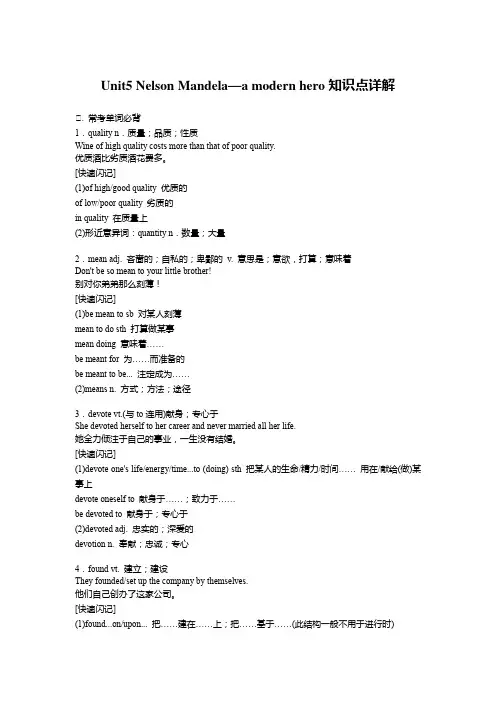
Unit5 Nelson Mandela—a modern hero知识点详解Ⅰ. 常考单词必背1.quality n.质量;品质;性质Wine of high quality costs more than that of poor quality.优质酒比劣质酒花费多。
[快速闪记](1)of high/good quality 优质的of low/poor quality 劣质的in quality 在质量上(2)形近意异词:quantity n.数量;大量2.mean adj. 吝啬的;自私的;卑鄙的v. 意思是;意欲,打算;意味着Don't be so mean to your little brother!别对你弟弟那么刻薄be mean to sb 对某人刻薄mean to do sth 打算做某事mean doing 意味着……be meant for 为……而准备的be meant to be... 注定成为……(2)means n. 方式;方法;途径3.devote vt.(与to连用)献身;专心于She devoted herself to her career and never married all her life.她全力倾注于自己的事业,一生没有结婚。
[快速闪记](1)devote one's life/energy/time...to (doing) sth 把某人的生命/精力/时间…… 用在/献给(做)某事上devote oneself to 献身于……;致力于……be devoted to 献身于;专心于(2)devoted adj. 忠实的;深爱的devotion n. 奉献;忠诚;专心4.found vt. 建立;建设They founded/set up the company by themselves.他们自己创办了这家公司。
倒装句1.(2016·某某·单项选择)Not until recently ______the development of tourist-related activities in the rural areas.A. they had encouragedB. had they encouragedC. did they encourageD. they encouraged【答案】C【解析】考查部分倒装。
当not until所引导的时间状语放在句首的时候,主句要使用部分倒装句。
排除AD项,B项为过去完成时,上下文中并没有体现出过去的过去的时间。
句意:直到最近他们才鼓励在农村地区开展与旅游业有关的活动。
故C正确。
2.(2015·某某·单项选择)Only after talking to two students ______ that having strong motivation is one of the biggest factors in reach goals.A. did discoverB. did I discoverC. I discoveredD. discovered【答案】B【解析】考查only置于句首的部分倒装。
副词only置于句首,强调方式状语、条件状语、地点状语、时间状语等状语时,主句要进行部分倒装。
如果被only所强调的状语为状语从句,该状语从句不倒装,只对主句进行倒装。
此题中only作为副词放在句首修饰时间状语after talking to two student,所以主句要进行部分倒装。
部分倒装是指将谓语的一部分如助动词或情态倒装至主语之前。
如果句中的谓语没有助动词或情态动词,则需添加助动词do,does 或did,并将其置于主语之前。
句意:在和两个学生交谈之后我才意识到拥有强烈的动机是实现目标的最大因素。
故选B。
(详细版)多个状语修饰副词的排列顺序多个状语修饰副词的排列顺序状语是修饰动词、形容词和副词的词语,用于描述动作或状态的方式。
当有多个状语同时修饰一个副词时,它们的排列顺序要符合一定的语法规则。
本文将介绍多个状语修饰副词时的正确排列顺序。
在英语中,状语通常按照下述顺序排列:1. 方式状语(manner):描述动作或状态的方式。
例如:"carefully"(小心地)、"quickly"(快速地)。
2. 时间状语(time):表示动作发生的时间。
例如:"yesterday"(昨天)、"every day"(每天)。
3. 频率状语(frequency):表示动作发生的次数或频率。
例如:"often"(经常)、"twice a week"(每周两次)。
4. 目的状语(purpose):表示动作发生的目的或原因。
例如:"to learn"(为了研究)、"for fun"(为了好玩)。
5. 例外状语(exception):表示特殊情况或例外。
例如:"usually"(通常)、"sometimes"(有时)。
6. 结果状语(result):表示动作带来的结果或效果。
例如:"so"(所以)、"thus"(因此)。
需要注意的是,这个排列顺序并不是绝对的,而是一种通用的规则。
在特定的语境中,状语的顺序可能会有所变化,取决于表达者的意图和强调。
以下是一些例子来展示这个排列顺序的应用:- He carefully walked to the store yesterday.- She often goes jogging in the park for exercise.- We usually have dinner together at home.- They quickly ran away when they saw the police.通过遵循这个状语排列顺序,我们可以更清晰地表达动作或状态,并避免歧义或误解。
Only的倒装用法(要点精讲)1.副词only置于句首,强调方式状语、条件状语、地点状语、时间状语等状语时,主句要进行部分倒装。
句型为:only+状语+be/助动词/情态动词+主语。
Only in a big city was it possible to buy a new wheelchair. 只有在大城市里才能买到新轮椅。
Only then did I realize the importance of English. 只有那时我才意识到英语的重要性Only in this way can you solve the problem. 只有通过这种方式你才能解决问题。
2.如果被only所强调的状语为状语从句,该状语从句不倒装,只对主句进行部分倒装。
用only对句子中的状语从句进行强调(1)We realized that there was a mistake when we had studied the data again.→Only when we had studied the data again did we realize that there was a mistake.只有当我们再次研究这些数据的时候,我们才意识到有错。
(2)He get some tickets in the end because there were some cancelled bookings.→Only because there were some cancelled bookings did he get some tickets in the end.一些预订被取消了,他才得以最后买到几张票。
(3)You can pass the exam if you study hard.→Only if you study hard can you pass the exam只有努力学习才能通过考试。
七年级英语副词修饰动词的位置单选题40题1. Tom often runs ______ in the morning.A. fastB. quicklyC. slowlyD. hard答案:A。
本题考查副词修饰动词。
“fast”“quickly”“slowly”“hard”都可修饰“run”,但“fast”侧重于速度快,“quickly”侧重于动作迅速,“slowly”表示缓慢,“hard”表示努力、艰难。
在校园晨跑场景中,通常用“fast”形容速度快。
2. Mary sings ______ in the music class.A. beautifullyB. loudlyC. clearlyD. happily答案:A。
“beautifully”“loudly”“clearly”“happily”都能修饰“sing”,“beautifully”强调唱得优美,“loudly”侧重声音大,“clearly”指清晰,“happily”表示开心。
在音乐课堂唱歌场景中,“beautifully”更符合表达唱得优美。
3. The students listen ______ to the teacher.A. carefullyB. seriouslyD. patiently答案:A。
这几个词都可修饰“listen”,“carefully”意为认真地,“seriously”指严肃地,“quietly”是安静地,“patiently”表示耐心地。
在学生听老师讲的场景中,“carefully”更能体现认真听讲。
4. Jack plays football ______ on the playground.A. wellB. goodC. niceD. fine答案:A。
“well”是副词,可修饰动词“play”,“good”“nice”“fine”都是形容词,不能修饰动词。
所以选“well”,表示踢得好。
倒装句用法总结归纳之袁州冬雪创作一、部分倒装:在正式文体中,never, seldom, rarely, little, hardly, scarcely, no sooner, no longer, nowhere 等含有否定意义的副词若位于句首,则其后要用部分倒装:I shall never forgive him. / Never shall I forgive him. 我永远不会饶恕他.He seldom goes out for dinner. / Seldom does he go out for dinner. 他很少出去吃饭.He little realizes how important this meeting is. / Little does he realize how important this meeting is. 他不甚大白这个会议的重要性.注意:(1) 对于not…until句型,当not until…位于句首时,其后的主句要用倒装语序:He didn’t leave the room until the rain stopped. / Not until the rain stopped did he leave the room. 雨停了之后他才分开这房间.(2) 某些起副词作用的介词短语,由于含有否定词,若位于句首,其后要用部分倒装: On no accounts must this switch be touched. 这个开关是毫不克不及触摸的.(3) 但是,in no time(当即,顿时)位于句首时,其后无需用倒装语序: In notime he worked out the problem. 他顿时就算出了那道题.2.“only+状语”位于句首时的倒装当一个状语受副词only的修饰且置于句首时,其后用部分倒装语序: Only then did he realize that he was wrong. 到那时他才意识到他错了. Only in this way are you able to do it well. 你只有用这种方法才干把它做好.3. “so+adj. / adv.”位于句首时的倒装副词so后接形容词或副词位于句首时,其后用部分倒装: So cold was the weather that we had to stay at home. 天气太冷,我们只好呆在家里. So sudden was the attack that we had no time to escape. 袭击来得非常突然,我们来不及逃跑.4.“so+助动词+主语”倒装当要暗示前面提出的某一必定的情况也同样适合于后者,通常就要用“So+助动词+主语”这种倒装布局: You are young and so am I. 你年老,我也年老. If he can do it, so can I. 要是他能做此事,我也能.注意: (1) 若前面提出某一否定的情况,要暗示后者也属于同样的否定情况,则应将其中的so改为neither或nor:You aren’t young and neither am I. 你不年老,我也不年老.She hasn’t read it and nor have I. 她没有读它,我也没有读. (2) 注意该布局与暗示强调或同意的“so+主语+特殊动词”布局的区别:"It was coldyesterday." "So it was." “昨天很冷.”“的确很冷.”"Father, you promised." "Well, so I did." “爸爸,你答应过的.”“嗯,是答应过.”5. 由“not only…but also”引出的倒装当not only…but also位于句首引出句子时,not only 后的句子通常常使用部分倒装形式: Not only is he a teacher, but he is also a poet. 他不但是一位教员,而且是一位诗人. Not only did he speak more correctly, but he spoke more easily. 不但他讲得更正确,也讲得更不费劲了.6. 虚拟条件句的省略与倒装当if引导的虚拟条件从句中含有had, were, should等时,如将if省略,则要将had, were, should等移到主语前,构成倒装句:Had you come yesterday, you would have seen him.若你昨天来,你就会见到他了.Should you require anything give me a ring. 如果需要什么,可以给我打电话.Were it not for your help, I would still be homeless. 要不是你帮忙,我会仍然无家可归.注意:省略if后提前的had纷歧定是助动词: Had I money, I would buy it. 假若我有钱,我就会买它.二、完全倒装:1.here 和there位于句首时的倒装暗示地点的here和there位于句首时,其后用完全倒装形式.这类倒装句的谓语通常是动词be和come, go等暗示移动或动态的不及物动词:Here’s Tom. 汤姆在这里. Here comes the bus. 公共汽车来了. There goes the last train. 最后一班火车开走了.注意:(1) 以上倒装句中的谓语动词come和go不克不及用停止时态,即不克不及说 Here is coming the bus. (2) 若主语为代词,则不倒装:Here I am. 我在这儿./ 我来了. Here it comes. 它来了.(3) 其中的动词有时也能够是stand, lie, live等暗示状态的动词(暗示存在): There stood a desk against the wall. 靠墙放着一张书桌. Once upon a time there liveda man known by the name of Beef. 从前有个人名叫比夫.2.away和down等位于句首时的倒装地点副词away, down, in, off, out, over, round, up 等位于句首时,其后用完全倒装语序.这类倒装句的谓语通常暗示动态的不及物动词: Away went the runners. 赛跑选手们跑远了. Round and round flew the plane. 飞机回旋着. The door opened and in came Mr Smith. 门开了,史姑娘先生进了来.注意:若主语为人称代词,则不克不及用倒装: Away he went. 他跑远了.3.状语或表语位于句首时的倒装为了坚持句子平衡或使上下文衔接慎密,有时可将状语或表语置于句首,句中主语和谓语完全倒装: Among these people was his friend Jim. 他的朋友吉姆就在这些人当中. By the window sat a young man with a magazine in his hand. 窗户边坐着一个年老人,手里拿着一本杂志.注意:在表语置于句首的这类倒装布局中,要注意其中的谓语应与其后的主语坚持一致,而不是与位于句首的表语坚持一致.比较: In the box was a cat. 箱子里是一只猫. In the box were some cats. 箱子里是一些猫. 4. 分词和不定式置于句首的倒装有时为了强调,可将谓语部分的现在分词、过去分词或不定式置于句首,从而构成倒装: Buried in the sands was an ancient village. 一个古老的村庄被埋在这沙土之中. To be carefully considered are the following questions. 下列问题要仔细思索.。